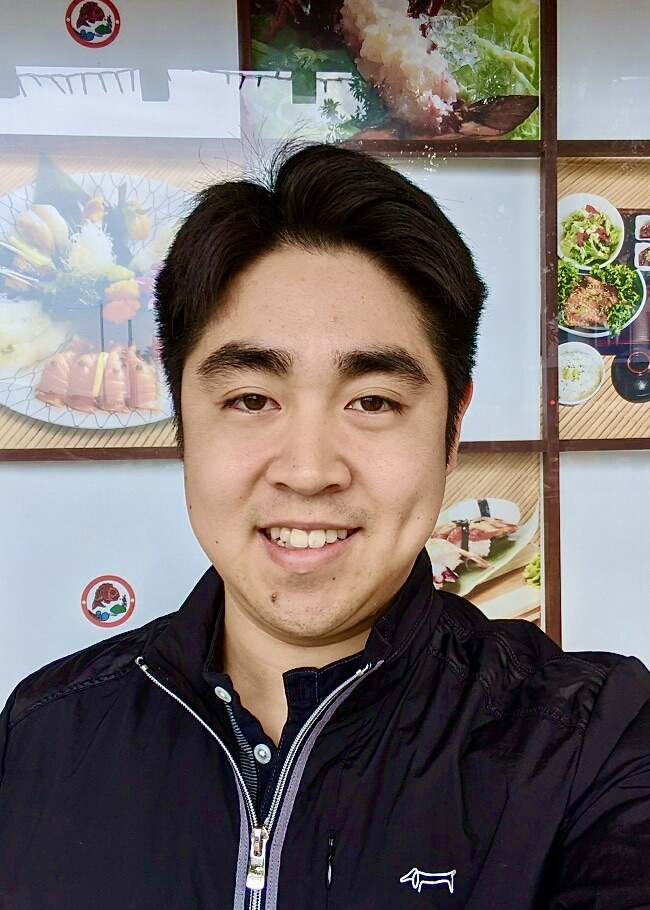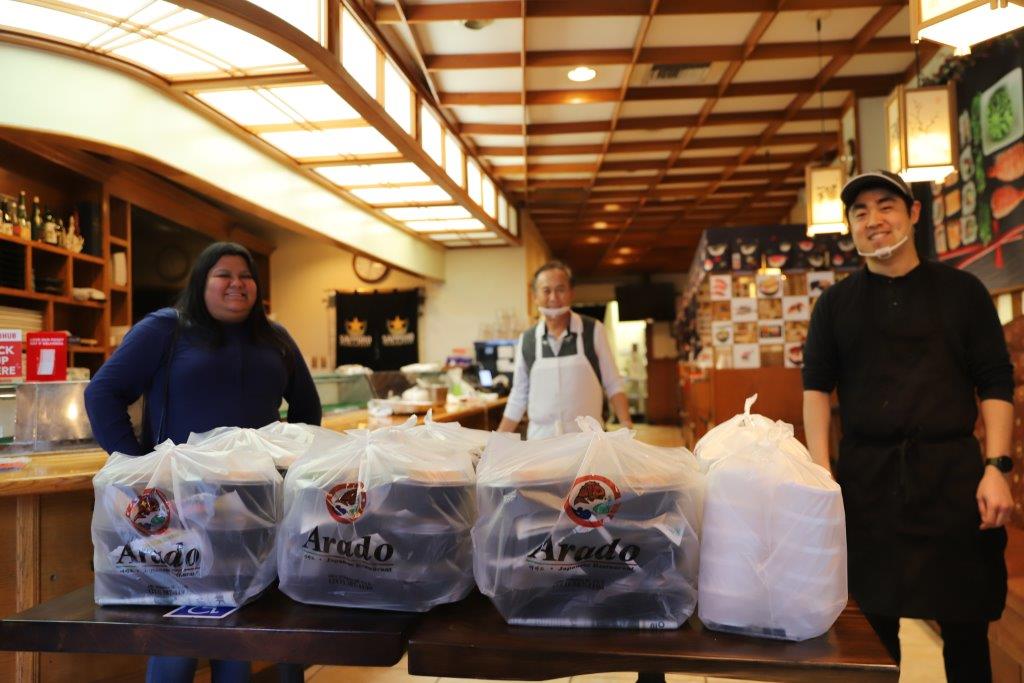Sam is a second-generation small business owner in Koreatown. His parents have owned and operated Arado Japanese Restaurant at a Wilshire Boulevard strip mall since 1995. Sam spoke about the devastating impact that the Covid-19 shutdown has had on his family’s business, and reflected on the changes that he has seen as first-generation businesses in Koreatown change hands. Arado is a community partner in KYCC’s food and essentials delivery program, #KYCC ❤️Ktown, and was the first restaurant to make hot meals for isolated elders in our community.
Where is your hometown?
My hometown is Koreatown. Actually, I was born and raised right across the street from my dad’s restaurant—Arado Japanese Restaurant. I went to college at UC Davis—I guess I was gone for a while—but now I’m back here.
Do you live or work in K-Town?
I help out at Arado. This is my dad’s life story right here. It’s a very family-oriented restaurant, and we’ve been here for almost 26 years. It’s as old as I am. My father decided to open this place right after I was born and he’s been doing this ever since ‘95.
When we first opened, it was just a sushi bar. We were doing so well, but then one night there was a fire—this happened about 20 years ago. That was our entire business—their entire life. I guess my dad decided, “You know what? There’s an open space right next door. Let’s turn this into a cafe. And we’ll sell some of the food that we have, like hamburger steak, and give out some coffee to the customers.” And so this place became known as a café.
While we were rebuilding Arado, we decided to break down the wall in between and connect the two places, so now it’s just one big space. We have sushi, but sometimes we still make the coffee for the customers as a kind of ode to a café. It’s like having a secret menu.
Who is your main clientele?
The older generation who have lived in Koreatown for a long time. Now they’re older grandparents and people with families, so they bring their kids and grandkids—it’s like a legacy thing, I guess. I think it’s because we’re very old school. We still do ads through the radio. We don’t do Yelp or Google or internet ads. Everything’s very old school; I’m sure most places in Koreatown are like that. But it’s been working and the funny thing is, we get those kids who grow up and come back, and they’re like, “I used to come here with my parents and we’d be here all the time.” And then they’re bringing their kids now, so it just kind of gets passed down through the generations.
What do you think about some of the changes between first- and second-generation restaurants?
I totally agree that with the second generation, we eventually have to move to digital. Yelp ads appeal to the younger generation. But at the same time, that change is going to take longer than just a couple of months. We can’t just change it. You can’t just take over your parents’ restaurant and then completely expect a new customer base—it’s just not gonna happen overnight, especially for us.
We’re an old school sushi place. We have the younger kids—they don’t want to spend top dollar on fish. They come in for the quick food—the bento boxes— that they can just grab and go. Whereas the older generation—they want to sit down and they want the private rooms. They want to talk with the customers or whomever they came with. And I think that’s important in the sense that we need to find a menu for both generations. We’re constantly changing and updating our menu to reach out to both generations.
You have to understand that the older generation has been doing this for a while now—like, 20 plus years. They must have been doing something right. And even though they don’t fully understand technology sometimes, it’s okay to have a little bit of both—the old style and the new style—you just have to do it slowly.
How has Covid-19 affected your business?
I can’t say for other businesses, but for us after that whole Korean Air rumor, people definitely were afraid even though it wasn’t true. They were afraid of everything. Even on the day the rumor came out, I overheard some of our customers talking about it. And I saw a decline in people coming in just because of that one rumor. And now that it’s actually here, we have had to completely change our entire system. We have workers who have been here for 10-plus years and we’re not letting any of them go. But you know—we can’t have them work every day. It’s hard. It’s not just hard—it’s impossible—to keep up with all the money and financials.
Adjusting to having everything to-go into delivery—it’s just not what we’re used to because we’ve been a sit-down restaurant for 25 years. And to expect people to only order to-go—we’ve had some angry calls like, “Why can’t we eat at the restaurant?” In the beginning, some people didn’t understand the mandate—especially the older grandmas and grandpas. They’d walk a couple blocks expecting to sit down and eat but they hadn’t really heard the news or they didn’t understand. It’s terrible to have to send them back, or tell them they have to get to-go.
But we’re trying to keep our spirits up. That’s the best we can do for everyone—or the people who are still here—where everyone’s hands on. We’re all trying to do everything we can to assess our lives. We’re all trying to get by so hopefully this thing passes quickly enough.
How does Arado’s partnership with KYCC help you help the community?
#KYCC ❤️Ktown is kind of like a win-win situation for everybody. I think it’s great of you guys to do that for both sides. Like I said, the elderly come by—they walk long, long blocks. They come by only to have to get rejected. And it’s good to have a system to support both the restaurants and the community.
What are your thoughts on Koreatown?
I don’t really remember much of the area I grew up in. But I remember I went to St. James, which is like one block from the restaurant, so everything was walking distance. From home to school, and then to the restaurant—that was my daily schedule. The restaurant became like my second home. I grew up with everyone here—all the waitresses and workers, the staff. They have all known me since I was a tiny, tiny kid. There were times I did my homework there, or times I slacked off and just fell asleep. I guess I grew up with the customers too, so they all remember me as “that kid.” A second son. And even now they’re like, “Oh my god, you grew up so much.” I love that. I don’t really remember them, or know who exactly they are, but they’re all kind of familiar and I recognize them.
Where is your favorite place in Koreatown?
I have the most vivid memories from Liberty Park—that front lawn area by Radio Korea in front of Aroma. I just remember that area from the World Cup, when everyone gathered around. Crazy. Everyone was wearing red. I was so little, but I remember that pretty vividly—just the colors and the amount of people—I’ve never seen so many people gathered there at once.
It felt like that was the center of Koreatown. Everything there resembled Koreatown—the red colors, red shirts—I had those red thunder sticks. it just seems like the opposite of right now, where Koreatown is so empty.
I don’t really go around there as much anymore, but I used to go to Aroma Golf a lot to take lessons or visit after school sometimes to blow off some steam. So I took that route every day for maybe a good eight years of my life. It was the only place I really went to in Koreatown when I was younger.

